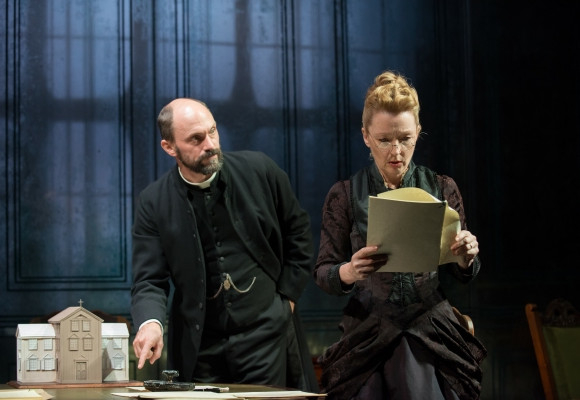Ghosts
Richard Eyre’s new production of Ibsen’s classic at the Almeida Theatre is delivered with quickness of speech and thought

It’s all Ghosts a-go-go down Islington way, with a Richard Eyre production of Ibsen’s emotional shocker that clatters straight through in 90 minutes and finds unexpected humour all over the place before the worm-eaten Oswald starts gibbering in the rosy glow of dawn like a stricken mountaineer falling short of the summit.
The action is consecutive, though not continuous, from morning to small hours, and the marvel of the play is always how many crises and revelations it packs in without seeming forced or arbitrary. The difference here is the quickness of speech and thought.
Eyre’s own text – using a literal translation by Charlotte Barslund – wastes no time in highlighting the maid Regina’s impatience, and her acquisition of French phrases (for the anticipated escape to Paris with Oswald), and even makes her drop a tray of crockery; Charlene McKenna‘s notably vivid performance is the opposite of pert and simpering. Her destiny is being condensed into a theatrical time-scheme from the off.
As in Stephen Unwin‘s sedately lucid version for English Touring Theatre, Regina and her father Engstrand (robustly done by Brian McCardle, without a hint of “comic relief”) are Scottish-accented; but the history of their abusive relationship is more darkly suggested.
I much admire Kelly Hunter’s Mrs Alving for the ETT, but Lesley Manville, very different, offers a powerfully projected portrait of a young woman grown old before her time, while big Jack Lowden as her sickly bohemian son, just back from Paris, is prematurely ageing.
This redefines the dynamic of their relationship as a more bizarrely tragic mismatch, and that in turn becomes hysterically physical in the last scene. The ghosts and shadows in the play, and the undiluted corruption of Captain Alving, are contained in the “look” of the room, designed by Tim Hatley as a deliquescent mausoleum of mottled glass panels, with the orphanage fire and the rising sun flooding the interior panels as a painterly, spreading infusion.
It’s an almost symphonic treatment of the play, with Peter Mumford’s lighting and John Leonard’s sound (there’s a premonitory rumbling in the air all night) creating an atmosphere in which everything seems inevitable; the big scene where Mrs Alving signs the papers for Pastor Manders (Will Keen) is the crucial seal of disapproval.
Keen plays this scene like a nervous spider, a bundle of tics and caveats, malicious slights and hypocritical cross-fire, his voice a sort of disembodied, husky telling-off. No wonder Manville audibly sighs with resignation, worn down by a battering of moral diagnoses and self-righteously despatched poisoned darts.
This is a play where everyone’s a loser and nobody wins, although Engstrand still has faint hopes for his sailors’ refuge and Regina at least has something still strong about her. It’s Manville’s Mrs Alving we’re left pitying the most, a frail, broken bird, separated from her son since he was seven when she saved him, she thought, from his own father by sending him away; the life-line was a death sentence.












